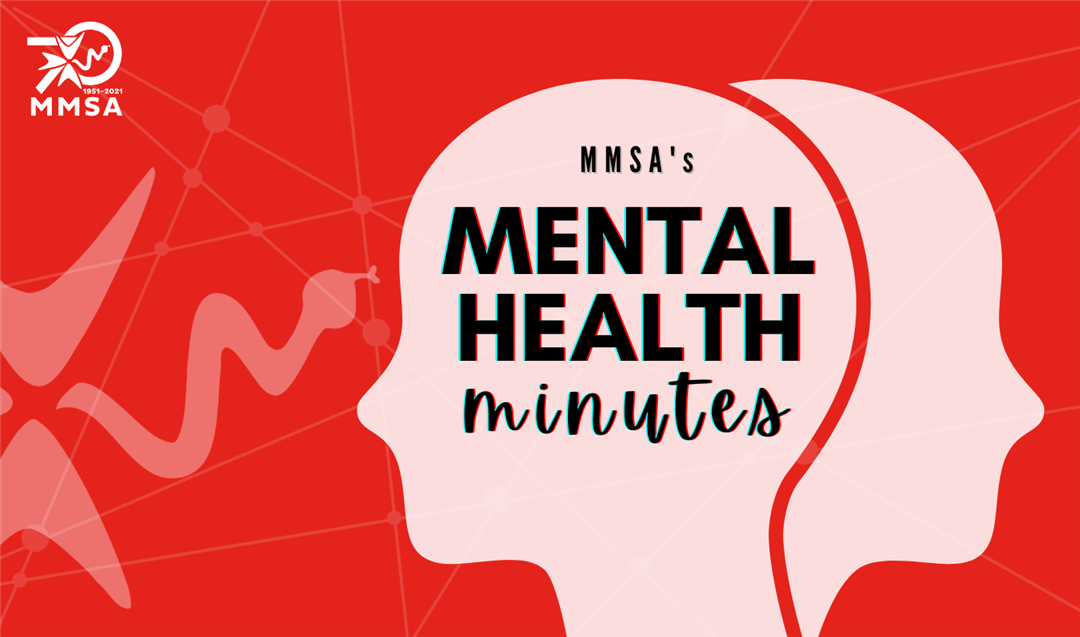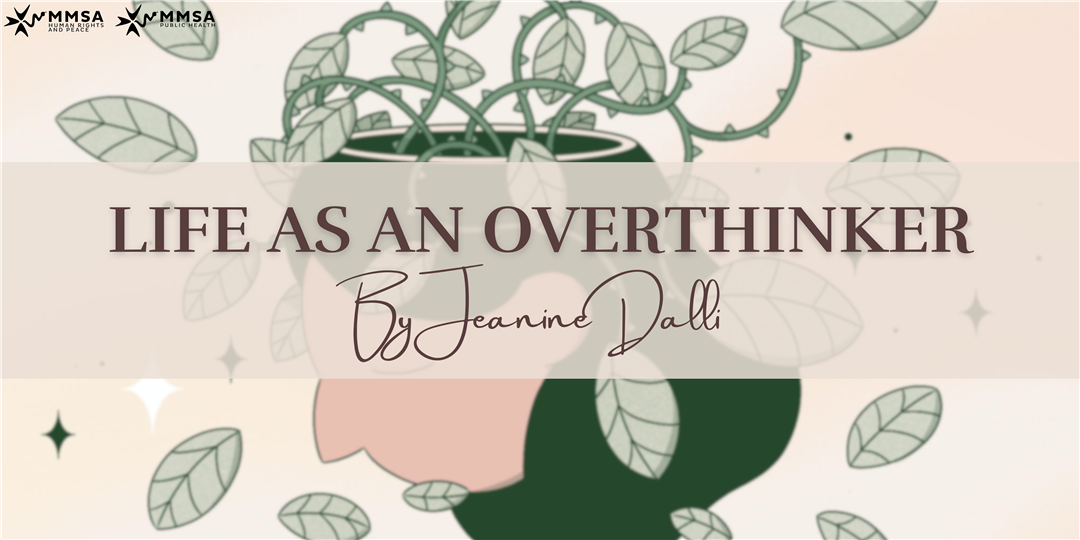Mental Health Minutes - Don’t Stress It!
Imagine this scenario - you have an assignment which you have been working on for the past 2 months, trying to perfect it. The deadline is at midnight tonight. You feel stressed, and work under pressure in order to finalize the whole assignment. You submit the project at 11:45 PM, and feel relieved, knowing that the work was well worth it.
On the other side of the globe, there is another student... They are feeling very stressed and overwhelmed, despite not having any deadlines or exams coming up. They are feeling very tense, and find that they cannot relax.
What is stress?
Stress is the body’s reaction to a challenge or demand. Furthermore, it is also a matter of perspective when it comes to those challenges.
In short bursts, stress can be positive, with the release of hormones (like adrenaline). These can help you avoid danger (fight or flight response), or meet a deadline. The hormones released help you concentrate, as well as heighten your reaction times, and strength (McEwen & Sapolski, 2006). When the challenge at hand starts to lessen or even resolve, usually one starts to feel better within a short period of time, knowing that the situation was temporary. The first scenario which has been described above is an excellent example of this.
Furthermore, stress has the beneficial effect of preserving balance in the body, which prolongs survival. (Yaribeygi et al., 2017).
When stress becomes excessive, or long-term, it creates anxiety and one may not be able to handle the situation/s at hand, and at times, in the absence of the stressor, one might not be able to return to a relaxed state. The second example described beforehand shows how this can be the case.
Good stress provides an opportunity for creativity and growth, while bad stress reduces productivity and creativity.
When there is stress that is prolonged, or chronic in nature, such as the stress experienced while studying for long periods of time, burnout may develop. This is a reaction whereby one feels exhausted, becomes cynical, and feels inadequate to do their job. This can be countered by recognizing the onset of burnout early, and taking steps early to stop burnout. Some strategies involve: changing work patterns, developing coping skills and taking more frequent breaks. (Maslach & Leiter, 2016)
There can be acute physical manifestations of excessive stress - some of these include:
- Slowing down of the digestive system
- Increased heart rate
- Increased breathing rate
- Effects on mood
- Emotional and behavioural symptoms - such as under/over-eating, nervousness, panic attacks, etc…
There are also effects on one’s health when faced with chronic stress, including:
- Digestive system - can have chronic stomach aches
- Obesity - due to an increase in appetite
- Immune system - weakening of the immune system might make one more prone to getting infections.
- Cardiovascular system - increase in blood pressure, heart rate and blood fat content (cholesterol and triglycerides) which increase cardiovascular risks.
Unfortunately, nowadays, we might find ourselves stressed or burnt out due to the pandemic we have found ourselves in, which serves as a relatively new source of stress and uncertainty. Living during a period where we might not be able to do activities which previously helped us cope with our stress might be detrimental to our mental and physical wellbeing. Furthermore, people might be becoming burnt out from the pandemic itself, having lived in this state for more than a year now.
It is now more important than ever to take care of oneself, both at an emotional and physical level, as well as checking in on friends to ensure that the pandemic does not impact our mental health too much.
Do I have excessive stress?
At this point, you might be thinking, “Oh! Do I have excessive stress? Is there a way to know?”. Well to try and reduce some of those worries, let me tell you about the Perceived Stress Scale (PSS). This is a questionnaire type survey, which tries to range your emotions over the past month - this will give an indication of the perceived levels of stress, by categorizing into mild, moderate and severe stress.
It is important to note that this test is by no means diagnostic, however it only gives an indication at that point in time, and if one is worried about their scores, it is recommended to seek further help.
As part of the MMSA’s SCOPH - Mind, Heart, and Body campaign, the PSS was distributed as much as possible to medical students and to the public. This can be found at the following link:
Feel free to give it a go :) Depending on your result, you will be guided to a page, where you will be given further advice.
Different types of stress reactions
There are different types of stress reactions. These include:
- Acute stress reactions - consist of a quick onset of extreme responses to sudden and severe stressful events.
- Adjustment disorders - occurs when someone cannot cope with a change in life circumstances (for example when losing job, or losing a loved one).
- Post-Traumatic Stress Disorder - occurs within months or years following a severe stressful experience that is life-threatening or catastrophic in nature.
- Bereavement and grief - these are defined as normal reactions to losing a loved one, and can take up to two years to resolve. If this is prolonged to more than two years, it may be an abnormal grief reaction.
(Katona & Cooper, 2015)
How to deal with stress
There are simple methods of dealing with stress when this is starting to feel excessive.
- Take care of yourself - this can be through healthy eating, exercising, getting plenty of sleep and taking a break when feeling stressed out.
- Talk to others - this can be a close family member, a close friend, spiritual guide or trusted colleague. Speak up about your feelings and your coping mechanisms.
- Avoid drugs and alcohol - while these may seem to help you in the short-term, they can in fact lead to worsening stress and anxiety in the long-term.
- Recognize when you need help!! There is a fine line between being able to deal with stress on your own, and the point where you need help. It is not always easy to recognize this point. If the stress continues to worsen(CDC, 2020)
Don’t Suffer Stress Alone!
If at any point, you feel too overwhelmed with stress, or if you start experiencing other thoughts, such as very low mood, or hopelessness, there are multiple services, which can offer help free of charge.
Some of these include:
- Appogg - 179
- Richmond Foundation - 1770
- Online anonymous chat at kellimni.com
Feel free to reach out to these services at any time.
References:
Yaribeygi H, Panahi Y, Sahraei H, Johnston TP, Sahebkar A. The impact of stress on body function: A review. EXCLI J. 2017;16:1057-1072. Published 2017 Jul 21. doi:10.17179/excli2017-480
Bruce McEwen, Robert Sapolsky, Stress and Your Health, The Journal of Clinical Endocrinology & Metabolism, Volume 91, Issue 2, 1 February 2006, Page E2, https://doi.org/10.1210/jcem.91.2.9994
Maslach, C. and Leiter, M., 2016. Understanding the burnout experience: recent research and its implications for psychiatry. World Psychiatry, [online] 15(2). Available at: <https://www.ncbi.nlm.nih.gov/pmc/articles/PMC4911781/> [Accessed 18 March 2021].
Katona, C. L. E., Cooper, C., & Robertson, M. (2015). Psychiatry at a Glance (6th ed.). Wiley-Blackwell.
Tips for coping with stress| publications| violence prevention| injury center| cdc. (2020, November 25). https://www.cdc.gov/violenceprevention/about/copingwith-stresstips.html
Written by Michael Pio Cilia - SCOPH Mental Health Coordinator
Reviewed by Dr. Daniel Vella Fondacaro







